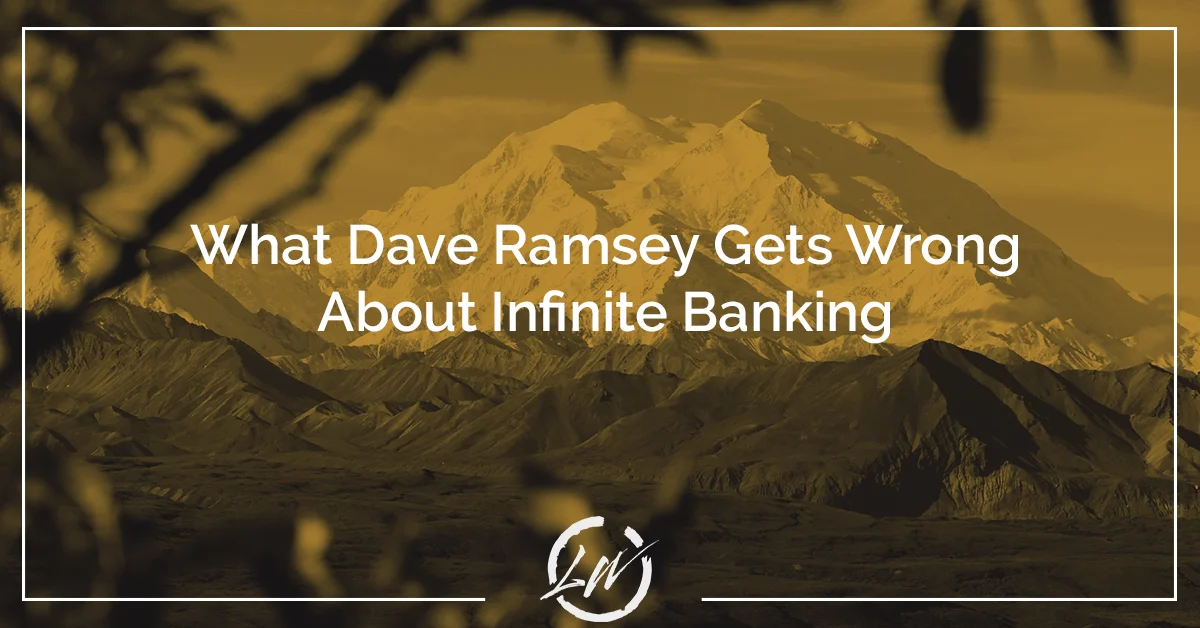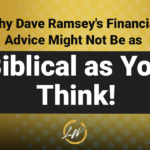Radio host Dave Ramsey Ramsey is a critic of the infinite banking concept, going as far as to call it a “scam” on an episode of his show broadcast at the end of 2020. However, there are a few things that Ramsey misunderstands about the process.
This article outlines three misconceptions that Ramsey, and other financial gurus, get wrong about infinite banking.
Infinite banking is not the same as whole life insurance
One of the first things that Ramsey and others get wrong about infinite banking is that it is not just an investment in whole life insurance. Whole life insurance is used in the infinite banking concept. It is a tool that allows you to become your own banker.
A common piece of advice that Dave Ramsey gives is to “buy term, invest the difference.” With this idea, you can potentially make money on another investment, but the cash within the policy must be left there to get a return down the line.
With infinite banking, instead of building cash and making another investment, you have the opportunity to build cash value into the policy and use that cash value for another investment. This gives you a policy that will continue to grow, allowing other potential investments to grow as well. This enables you to get a higher rate of return while also keeping your money in motion.
Infinite banking is not about investing in life insurance. It’s about using a policy in this new way to become your own banker, and becoming a banker includes financing your investments with your policy instead of cash….It’s the financing tool, the banking tool to do all things that we want to do in life.
Downplaying the value of a policy and exaggerating the value of other investments
Another misconception by financial gurus is downgrading the potential of a policy while exaggerating the potential of mutual fund or stock investments. For example, they often claim that percentage of growth in another investment such as a mutual fund is much higher than that of a whole life insurance policy, stating that it only sees about one to two per cent growth. By comparison, a mutual fund can see upwards of 12 per cent growth annually. However, it is likely, you will not be able to realize much money.
With a mutual fund, for example, the fees eat up some of that extra value. You would have to earn a gross of 8 to 9 per cent to pay for these fees to be able to net around 4.5 to 5 per cent.
With whole life insurance, although the growth is often quoted at 1 to 2 per cent, it is usually in the range of 4 to 5 percent annually over 30 years. In the example above, this would be about the same as you would make using a mutual fund. The main difference, however, is that the return is guaranteed. Additionally, it grows tax-free. Moreover, term policies get more expensive as you get older. So once the term period has ended, it is likely to cost you more money to purchase another one. Is it really worth the risk to try and earn 8 or 9 per cent just to end up netting 4.5 to 5 per cent, that you could get into policy even having to break a sweat or worry about the volatility of anything?
The cost of whole life insurance vs. the dangers of not investing the difference
With the concept of “buy term, invest the difference,” success depends on people investing the difference. However, many don’t have the knowledge to do it or the resources to get started. However, if you are not making another type of investment, you are not getting much out of the term policy. You are still paying fees without gaining wealth; this has the potential to do more harm than good down the line.
For example, once a term is over, a new policy would likely be more expensive. Additionally, it may be more challenging to get one due to changes in health as you grow in age. Due to this, it may not be easy to get a new policy, leaving your family without enough money.
The only way money’s paid out is if you die, and the likelihood of you dying is very slim compared to the life insurance company having the money to use and cover that. A life insurance company doesn’t sell you term because they think that you’re going to die. They’re betting you’re going to live.
This is not to say that following the “buy term, invest the difference” mantra is bad; people just need to be aware of the risks that could come along with doing so. For example, there is potential to make good money through investments in the stock market or mutual funds, but these may not be guaranteed, and you must be equipped with the knowledge necessary to be successful.
With whole life insurance, a lot of these issues are not prevalent. It may cost more upfront, but you are covered for your whole life; the investment has more certainty. Therefore, having a whole life policy, especially when you are young, can significantly benefit you when you are older.
Infinite banking is not an investment in whole life insurance. It is not whole life insurance. It is a system, a concept of using a policy to become our own banker, that would include financing other investments you want to make.
Podcast episode: What Dave Ramsey gets wrong about infinite banking
List to our experts discuss this topic on our Dollars and Nonsense podcast. There are two episodes about Ramsey and his misguided advice:






